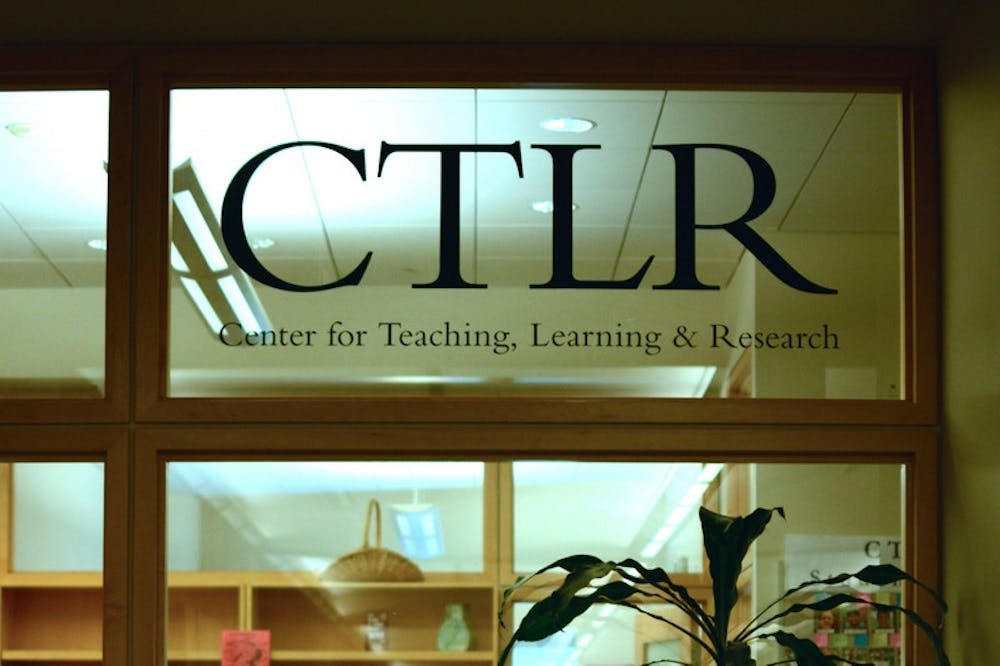Within the Center for Teaching, Learning and Research (CTLR), the Writing Center is dedicated to helping students through every stage of the writing process. The Peer Writing Tutor Program is the workhorse and heart of this center.
Senior Lecturer and Tutor in Writing and Director of the Writing Center Mary Bertolini is in charge of training, assigning, evaluating and supervising her Peer Writing Tutors. Maggie Morris ’15 is the head peer writing tutor and is responsible for approving tutoring sessions, running evening make-up sessions and assisting the Program Director. Cate Costley ’15 is the head mentor and manages and guides the Writing and Academic Mentors attached to First-Year Seminars.
She also runs evening make-up sessions and assists the Program Director. Robert Silverstein ’15 is the manager of drop-in tutors, and therefore manages, supervises and assigns evening shifts, while also creating publicity for the program and assisting the Program Director.
Peer Writing Tutors and Writing Academic Mentors are trained mentors designed to aid first-year students with writing and presentation skills. Described by Bertolini as “approachable, courteous, knowledgeable, patient, diplomatic and generous,” tutors are expected to meet with their students individually for up to sixty hours over the course of the semester, and are also made available to each Commons on frequent occasions.
To receive the honor of becoming a Peer Writing Tutor, students must either have been nominated for the Paul W. Ward ’25 Memorial Prize, an annual award given by the faculty to those first-year students who are identified as producing outstanding essays, or specifically requested by a faculty member to join their first-year seminar or college writing course.
Before becoming a peer tutor, students receive extensive training from the CTLR. Bertolini describes the training as including “practice writing conferences, instruction in starting with macro problems and moving to micro problems, thesis and organization review, oral presentation training, dealing with a variety of specialized student challenges and problems, support for international students, information about writing in different majors and disciplines, grammar review and information about other support services on campus.”
In addition, Writing and Academic Mentors, who work exclusively with First-year Seminars, work with Director of Learning and Resources Yonna McShane to receive training in time management and study skill strategies. New peer writing tutors attend six training sessions, while experienced tutors attend three. All tutors receive paid compensation from the CTLR for their time.
Peer writing tutors were designed to help students grow as writers. Their motto is “help the student write the best paper the student can write, not the best paper the tutor can write.” Peer tutor Madelaine Hack ’17 spoke to this issue of preserving academic integrity.
“Students look at us like we are the quick fixes, but we can’t tell them what to do,” Hack said. “We can only guide them to create a finished project of their own. All I can do is help to lead them in the right direction.” Bertolini also recognizes the delicacy of the issue.
“The easiest thing for tutors to do would be to fix papers, but that violates the Honor Code,” she said. “Most of our training consists of ways for tutors to help students make their own revisions on their own papers.”
In order to emphasize that tutors are trained to grow writers, not to fix papers, all Peer Writing Tutors must take the Academic Honesty Tutorial and participate in at least one practice writing conference a semester.
However, there is a growing sentiment from students that meetings with peer tutors are ineffective. Jake Brown ’17 verbalizes this dissatisfaction when describing his interactions with his peer tutor.
“It was only for ten minutes,” he said. “It was really awkward. I just showed her my paper, she said it was good, and I left. I would prefer to ask a friend for help than a stranger.” Although Brown’s experience only represents one voice, his opinion speaks to the larger problem of a disconnect between the expectations of peer tutors and their actual role.
The issue facing the peer tutors is an expectation gap. Students too often enter a session with their peer tutor with the expectation that their paper will be fixed by the end of the meeting, and peer tutors approach the session with the anticipation of being able to answer all of the students’ questions. The writing process often involves many revisions and drafts and the generation of new ideas takes time and cannot be manifested on the spot. Once peer tutors are viewed as authorized aid and not a cheat sheet, progress and perspectives can change. When asked about changes she would like to make to the program, Bertolini had some promising ideas.
“I would like to offer more varied training opportunities for my trained writing tutors and mentors,” she said. “Carrie Macfarlane, Director of Research and Instruction, has offered research workshops for the writing tutors and mentors, and I would like to offer more training in presentation technologies for those tutors as well. We now have writing tutors available in all five Commons on various evenings. I hope more students will take advantage of this wonderful opportunity right in their own dorms. Finally, this fall, we’ve launched a Writing Center Word press site (go/writingcenter), and we’ll be tweeting from the Writing Center (@MiddWritingCent or go/writingtweets).”
It is important to recognize the faces behind the Peer Writing Program and the students who make it all possible. The training and expectations are immense and should not be taken lightly. Hopefully by understanding the perspective and role of Peer Writing Tutors, students can be better equipped, and in the right frame of mind, for their next paper.
Peer Writing Tutors: Not a One-Way Street

Comments


